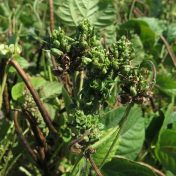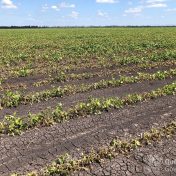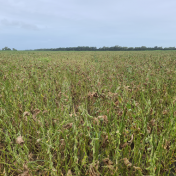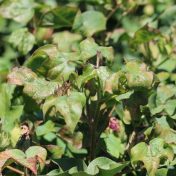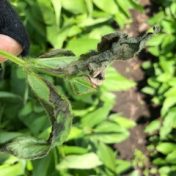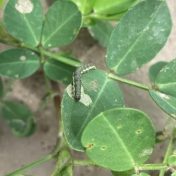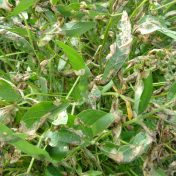In Central Queensland, both phytoplasma and tobacco streak virus are still a common occurrence this year in mungbean crops. Phytoplasma Transmitted by leaf hoppers, the specialised bacteria of phytoplasma can cause severe disease and reduce yield and/ or affected pods in mungbean and other grain legumes like soybean, peanuts, pigeon pea and chickpea. Phytoplasma infection in mungbean and other grain… Read more »
Disease surveys across northern New South Wales and southern Queensland have found that many sorghum crops have been impacted by rust. Sorghum rust is caused by the fungal pathogen, Puccinia purpurea, and is considered to be a relatively minor disease of sorghum in Australia. Symptoms Rust can infect sorghum crops at all stages of growth. Initial symptoms appear as small… Read more »
Disease surveys across southern Queensland have revealed a high incidence of Downy mildew in several soybean crops in April 2022. The downy mildew pathogen, Peronospora manshurica, infects crops during periods of rainy, humid weather. Though widespread, the disease is likely to have a minimal impact on yields. The pathogen can survive between soybean crops in infected seeds, on volunteer soybeans or alternative… Read more »
After the wet weather in recent weeks there have been several reports of powdery mildew in mungbeans across Queensland and northern New South Wales, and Fusarium wilt has been found in several southern Queensland crops. Monitor crops closely for disease symptoms, and contact our plant pathologist, Lisa Kelly at [email protected] or 0477 747 040 for further information on disease diagnosis…. Read more »
Soybean moths are on the move in the tropics with devastating populations reported in the Ingham region of NQ (see photo). Fuelling the outbreaks was a recent extreme heatwave event which saw temperatures ranging between 29-40 degrees Celsius for 12 straight days. While the heat may have made people lethargic, it greatly hastened the rate of larval development and many… Read more »
Leafhoppers (also known as jassids) rarely cause damage in cotton, so some unusual symptoms (leaf chlorosis that presented a little like cotton bunchy top disease) across several cotton fields in Queensland’s Burnett region last month that appeared to be associated with leafhoppers had both taxonomists and virologists searching for an explanation. Both the damage and leafhoppers present shared many of… Read more »
Late damage has been reported recently in an Onyx-AU (PBR*) black gram crop in the Burdekin. The most obvious damage was dead leaves, but closer inspection found full sized larvae (3 mm) and pupae in the petioles of damaged leaves. The causal agent was common bean fly Ophiomyia phaseoli (Agromyzidae), but in this instance control was not warranted, as the… Read more »
Halo blight, caused by a bacterial pathogen (Pseudomonas savastanoi pv. phaseolicola) is one of the major diseases of beans world-wide, particularly in temperate regions. In mungbean, symptoms on leaves start as small, water-soaked lesions that are surrounded by a yellow-green halo (Figs 1 and 2). Symptoms may be visible at the 1st or 2nd trifoliate leaf stage and are often… Read more »
Since early 2020, growers and agronomists have been nervous about the prospect of fall armyworm (FAW; Spodoptera frugiperda) invading their crops. So far, the majority of significant and damaging FAW infestations have been recorded from sweet corn, maize, and sorghum crops, with some isolated outbreaks in horticultural crops such as ginger and capsicum. Occurrences in other crops have been a… Read more »
As we enter the business end of the season, we want our soybean crop’s leaves to be a healthy green, as the healthier the leaves, the more the pods fill and the higher the yield. In a drought year, dryland crops turn brown prematurely due to lack of water, but in wet years or in irrigated crops, leaves should not… Read more »
